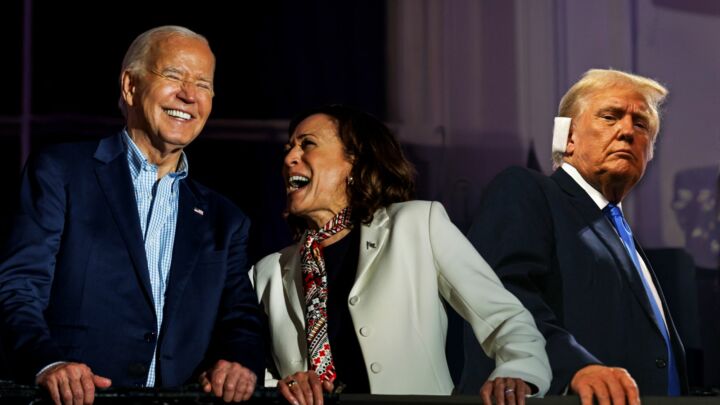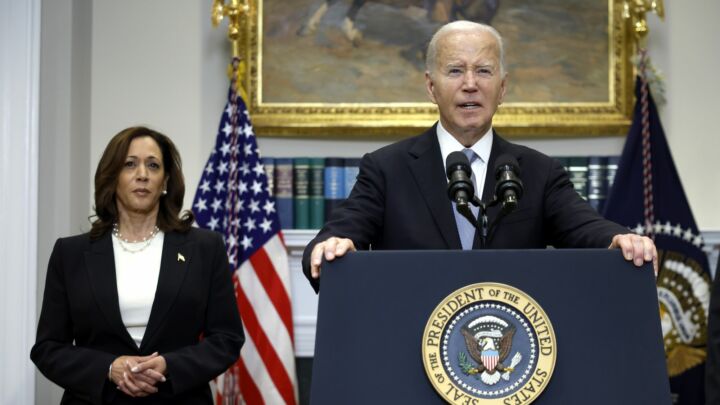The strange rehabilitation of Johann Hari
Why are our cultural elites fawning over a journalist so dogged by plagiarism and fabrication scandals?

Want to read spiked ad-free? Become a spiked supporter.
Over the past few years, our cultural elites have bemoaned the emergence of a ‘post-truth’ world. They have talked endlessly of the threat of ‘disinformation’ and turned ‘fact-checking’ into a crusade. All of which raises a question: why then are they still taking Johann Hari so seriously?
You might remember Mr Hari. For much of the 2000s, he was a young prig of a journalist, zealously delivering liberal-elite diatribes from his columnist’s pulpit at the Independent. He enthusiastically supported Western military interventionism, including the catastrophic Iraq War. He was a thoroughgoing climate-change alarmist, even at one point urging the government to force us to live ‘cleaner lives’. He was also a vehement advocate of the European Union. Such were his credentials, it was difficult to believe he wasn’t the love-child of George Monbiot and Polly Toynbee.
This frothing font of liberal sanctimony was everywhere for a while, across the press, on TV and on the radio. Until suddenly he wasn’t. By 2011, the mounting allegations of journalistic malpractice had become overwhelming. That September, he was forced to admit to both plagiarism and maliciously editing the Wikipedia entries of people he either disagreed with or disliked. He stepped down from the Independent soon after and seemingly retreated from public life, in the UK at least.
And yet here we are, 13 years on, and Hari’s stock has rarely been higher. His fourth book, Magic Pill, an exploration of the risks and benefits of weight-loss drugs like Ozempic, has just been released in a blaze of publicity. Like its predecessors, its cover carries enthusiastic endorsements from the great and the good, and it has generated countless reviews and media appearances.
It’s quite the make-over. A journalist once dogged by accusations of fabricating stories is now being treated like some brave, intellectual trailblazer, unveiling the dark truth about modern life – from the failure of the war on drugs in 2015’s Chasing the Scream to the perils of ‘ultra-processed’ food in Magic Pill. He now gives TED talks and writes guest essays in the New York Times. He is taken almost as seriously as he no doubt takes himself.
I’m all for redemptive story arcs, but there is something about Hari’s rehabilitation over the past decade, as a writer and journalist, that really sticks in the craw. It’s as if the precise nature of the allegations against him has been quietly, wilfully erased by sections of the media and publishing. There’s no way a journalist who didn’t have Hari’s politics would have been treated as leniently.
Part of the problem is that the scandals are being misremembered. Back in the 2000s, he wasn’t merely sprucing up some of his interviews with better quotes taken from elsewhere, as some – including Hari himself – have suggested. He was also doing something much worse. He also seemed to be warping facts and using conveniently unverifiable quotes, all in the service of promoting what he deemed to be good, liberal-left causes, from environmentalism to Western interventionism.
Take his January 2003 piece championing the invasion of Iraq. He claimed that on a trip to that benighted country, locals told him that they ‘love’ British and American democracy and that most would ‘welcome friendly bombs’: ‘The moment they established that I was British’, he wrote, ‘[Iraqi] people would hug me and offer coded support’. Yet, as some astute observers discovered at the time, in a previous feature, Hari had actually complained about how reluctant the Iraqis he met had been to express their views and feelings.
Or take his equally dubious piece on France’s ‘secret war in Africa’. There he claimed French soldiers who had served in Rwanda during the genocidal events of 1994 told him that ‘children would bring us the severed heads of their parents and scream for help, but our orders were not to help them’. The aid worker who was translating for him at the time later said that she never heard the French soldiers say anything like that.
If these allegations are true, it would seem that accuracy didn’t matter much to Hari. More important was appearing to be on the right side of history. Of striking the politically correct, moralistic pose and then basking in the applause of the liberal-left media establishment. From his perch at the Independent, Hari performed the role of a courageous truth-teller, while in reality churning out liberal-elite propaganda.
There were some who called Hari out early on. As early as 2000, comedian and writer Ben Elton wrote a letter to Varsity, the University of Cambridge student newspaper, taking the then 21-year-old Hari to task for his ‘displays of ignorance’ in an anti-Israel piece he had written. ‘[Hari] asserts that only Jews can be Israeli citizens, which is untrue’, wrote Elton, ‘and he tells us that the ultra-orthodox have a slogan, “Israel for Jews alone”. A slogan neither I, nor anyone else has ever heard before.’ Elton then added all too presciently: ‘I suggest that Hari simply made it up.’
Three years later, when Hari was on the verge of leaving the New Statesman for a role at the Independent, Private Eye rounded on him, pointing to falsehoods in three New Statesman stories. Hari claimed to have spent a month reporting from Iraq when, according to Private Eye, he had just spent two weeks on a package tour of its ancient sites – perhaps that’s where he spoke to all those Iraqis pleading for the West to bomb their country to liberation? Elsewhere, Hari claimed to have seen a demonstrator being killed at the Genoa G8 summit. Private Eye was not convinced: ‘As several witnesses can attest, Hari wasn’t there, having hailed a taxi to escape the scene some time before [the demonstrator suffered fatal injuries].’
Yet Hari’s shaky relationship to the truth, already evident from his days as a student journalist, clearly didn’t put off Britain’s media establishment. They loved the sanctimonious verve of this posturing ‘journalism’. Not because it yielded any insight, or got to the truth of the matter, but because they agreed with its politics.
At the Independent, he cemented his reputation as the golden boy of British journalism. Britain’s cultural and media gatekeepers lapped up his every self-aggrandising utterance. In 2003, he was named ‘young journalist of the year’ at the Press Gazette awards. Four years later, Amnesty International named him ‘journalist of the year’. Then, in 2008, the then 29-year-old Hari became the youngest winner of the George Orwell Prize for political writing.
The Orwell Prize judges praised Hari for his ‘courageous reporting and forceful writing with honest analysis’. It would later emerge that one of the four ‘courageous’ and ‘honest’ pieces Hari submitted – ‘How multiculturalism is betraying women’ – bore an uncanny resemblance to a piece published earlier in Der Spiegel.
While the media class fawned over Hari, more discerning readers had long noticed that something wasn’t right. It all kicked off properly in June 2011, when a leftist group discovered that Hari’s interview with Italian philosopher Antonio Negri included quotations copied and pasted from his books. In a blog post a few days later, journalist Brian Whelan made several further detailed allegations of plagiarism against Hari. Others soon pointed out that Hari’s obsequious 2006 interview with Venezuelan leader Hugo Chavez included quotations that had been lifted from a 2001 piece in the New Yorker. The more people dug into his pieces, the more potential mendacity they discovered. Unsourced quotes. Rampant plagiarism. And utterly unbelievable anecdotes.
Then, in July 2011, another aspect of Hari’s ‘work’ came more fully to light. In a column for the Spectator, journalist and writer Nick Cohen drew attention to what happened to those who had crossed Hari, either for disagreeing with him in public or questioning his methods in private. A Wikipedia user called ‘David R from Meth Productions’ would fill their entries with nasty, often personal allegations. So when journalist Christine Odone challenged Hari over his work when he was at the New Statesman, David R edited her Wikipedia page to claim she was a ‘homophobe’ and an ‘anti-Semite’. When Cohen himself criticised Hari for the flagrant inaccuracies in his review of Cohen’s book, What’s Left?, David R said Cohen was an alcoholic. During David R’s six-year-long campaign of relentless trolling, countless others, including spiked, were also the subject of malicious Wikipedia edits. At the same time as ‘David R’ was demonising Hari’s opponents, he was turning the entries of Hari and his media friends into hagiographies. In 2011, it emerged that David R’s IP address was the same as the offices of the Independent newspaper. Johann Hari tried to blame a non-existent sub-editor, before he eventually admitted it was him.
By September 2011, the smoke billowing from Independent HQ was too thick even for Hari-championing editor Chris Blackhurst to ignore. The paper announced an investigation and, after several weeks, it admitted it had found a fire raging on Hari’s chair. He took unpaid leave and – incredibly – after receiving and rejecting an offer to return to the Independent in January 2012, he stepped down.
But he didn’t step back. He simply moved to America where, free of notoriety and the taint of scandal, he set about repositioning himself as a writer of ever-so-serious books. And it has worked. A journalist who faced endless accusations of deceiving readers and smearing his opponents is once again being warmly embraced by the cultural establishment.
If his books contained anything of intellectual significance, I could understand the attention being foisted on them. But they really don’t. Yes, they’re all written with his characteristic story-telling verve, as Hari takes us on various ‘journeys’ towards an unexpected, Earth-shattering revelation about addiction or depression or weight-loss drugs. But it’s just an appearance, a formal effect of Hari’s narrative style. He only seems to be shattering illusions, or revealing some unexpected truth. In reality he tends to only ‘reveal’ a set of liberal-left prejudices, or the blindingly obvious. In recent books, he’s ‘exposed’ how a right-wing ‘war on drugs’ approach to addiction isn’t working (Chasing the Scream); that prescribing countless antidepressants benefits Big Pharma rather than our mental health (Lost Connections); that digital technologies are damaging our brains (Stolen Focus); and that the ultra-processed, fast-food industry has made us fat (Magic Pill).
No doubt Hari’s champions enjoy these screeds’ easy denunciation of certain aspects of the modern world. No doubt they find the low-grade anti-corporate conspiracy theories edgy – Big Tech, Big Pharma and Big Food loom in the background of Hari’s narratives. No doubt they love the soft-soap anti-capitalism. But they can hardly claim that any of this stuff is enlightening or ground-breaking. Who doesn’t think the war on drugs is failing or that there may be more to depression than chemical imbalances in the brain? What next? Is Hari going to expose the claim that God created the world in six days as a bit of a myth?
What’s more, it’s not exactly clear that Hari has entirely changed his ways. Magic Pill has already landed its author in trouble after he falsely accused food critic Jay Rayner of taking Ozempic and discovering it had robbed him of pleasure in his favourite Parisian restaurants. Hari apologised saying he had ‘confused an article by… Rayner in the Guardian with an article by Layla Latif in the same paper talking about losing pleasure in food’ (sic). Latif was not happy with this. She had written a piece along these lines, but her name is Leila not Layla. And like Rayner, she had also never received the Ozempic jab.
That was no doubt an honest mistake. Fact-checking Hari’s books must be a Sisyphean task, akin to searching for hay in a haystack. A few unwitting errors are understandable. But already others have pointed out a more systematic problem with Magic Pill – namely, that Hari has misused certain data to make his case that we have built a ‘food system that poisons us’. As Tom Chivers points out in the Guardian, some of the studies Hari cites simply don’t back up his points, while other claims are based on findings that are not statistically significant.
This is not a problem confined to Magic Pill. Every single one of his four pop-science books has suffered from something similar. In Stolen Focus, Hari claims that thanks to the digital revolution, there is ‘evidence that the world is speeding up, and that process is shrinking our collective attention span’. As one keen-eyed critic pointed out, this claim rests on a single study from Denmark which even the researchers involved admitted lacked a strong empirical basis. One of the researchers actually felt the need to personally intervene in the ensuing debate, stating that ‘our results seem to be mixed up in [Hari’s] book’. ‘We are not reporting evidence of shortened attention spans of individuals’, he continued, ‘nor are we concluding that social media is causing this… I am not happy with the misrepresentation of our results in this way. I keep emphasising that these findings are not at all about your ability to focus.’ Which is pretty damning, given that Stolen Focus holds up this study as evidence we are losing our ability to focus.
The old suspicions about Hari’s work persist, too. Just like his Noughties journalism, his books are jam-packed with perfect, thesis-illustrating anecdotes and perfect, thesis-proving quotes from any number of unverifiable sources. But now he seems to have a new string to his bow, forcing science against its wishes into the service of his worldview. The truth, as ever, seems a secondary concern.
You’ve got to hand it to him in some ways. He just keeps on keeping on. Despite his reputation, his self-importance remains undimmed. That, in itself, is not surprising. It’s our cultural elites’ willingness to continue pandering to Hari that is the real puzzle here.
In other contexts, the very same people are obsessed with ‘fact-checking’ and fighting ‘misinformation’. They feast on the errors of the right-wing. Yet they seem only too happy to give a free pass to Hari, a man whose complicated relationship with facts is legendary. It’s perplexing, or at least it would be if we didn’t already know why. Many in our media class were prepared to overlook rumours of his wrongdoing during the 2000s because they agreed with his politics. Today, our cultural elites remain eager to forget evidence of his wrongdoing during the 2000s because they still agree with his politics. Simply put, he’s their man. And so he continues to earn publishing deals and churn out half-baked books with very little scrutiny, honourable exceptions apart.
Johann Hari’s continued prominence is an indictment of our cultural and media elites, of their hypocrisy and cynicism. It seems they care far less for the truth than they do for the ‘virtuous’ poseur.
Tim Black is a spiked columnist.

Melanie Phillips and Brendan O’Neill – live and in conversation
Wednesday 26 June – 8pm to 9pm BST
This is a free event, exclusively for spiked supporters.
Picture by: Getty.
To enquire about republishing spiked’s content, a right to reply or to request a correction, please contact the managing editor, Viv Regan.








Comments
Want to join the conversation?
Only spiked supporters and patrons, who donate regularly to us, can comment on our articles.